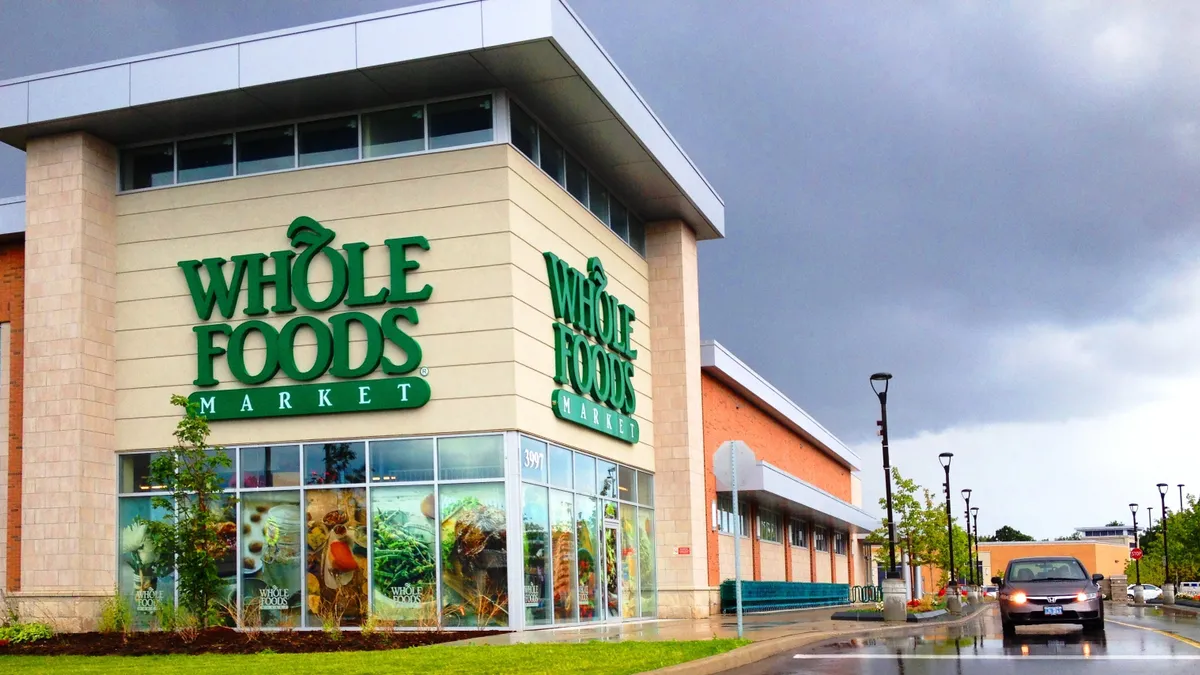Dive Brief:
- Whole Foods' 365 Everyday Value store brand has racked up $10 million in sales on Amazon.com since late August, according to a report from One Click Retail. The natural and organic brand, which sees 9% weekly sales growth on Amazon's site, is now the number two best-selling private label line the e-tailer offers.
-
Whole Foods’ private label success has affected two of Amazon’s top food brands: Wickedly Prime, which has seen flat sales growth since 365 debuted, and Happy Belly, which had a popular trail mix line discontinued in October.
-
Private label brands are just a small part of Amazon sales, generating 0.2% — or $450 million — of Amazon’s $177 billion in estimated revenue. The top selling private Amazon brand, Amazon Basics, offers generic versions of electronic accessories and contributes 85% of total private label sales.
Dive Insights
Just a week after Amazon started selling Whole Foods’ private brand products, sales surged to $500,000 — an unexpected jump that caught suppliers flatfooted. As a result, sales dipped to $300,000 the next week. But sales quickly rebounded, and the strong showing over four months reaffirms Whole Foods' private label lineup as one of the strongest assets Amazon gained when it purchased the grocery chain.
Top selling 365 products on Amazon.com include Whole Food snacks, canned goods, frozen vegetables and fruits — products that had a strong pre-acquisition following from consumers. This is good news for Amazon, as it means customers are following their favorite brands over to its site. It’s also great news for grocers looking to increase their online sales. Private label accounts for 14% of packaged food sales, and that number is expected to increase as grocers continue to develop the quality and taste of their private label offerings.
As grocers grow their e-commerce presence, they're using popular store brands to entice online shoppers. In response to the Whole Foods label with Amazon, Walmart-owned Jet.com announced in September that it would launch its own private label brand, called Uniquely J. The brand will start with 60 products like coffee, laundry detergent and paper towels, but will expand to include baby and bath products.
Building memorable stores brands is vitally important for retailers these days. Amazon made the leap with an already established brand, but continued sales growth is by no means a given. Walmart and Jet.com look to be worthy competitors, and have more private label offerings in the works. Kroger, meanwhile, is rapidly evolving both its private label assortment and its ClickList store pickup program.
Fresh sales, an area where Amazon has struggled in the past, also play a crucial role in gaining and retaining online shoppers. A report from market research firm Field Agent found consumers prefer buying fresh produce online from Walmart.com over Target.com, Jet.com and Amazon.com. The survey took place before the Amazon deal with Whole Foods was completed, but with 25% of consumers saying they prefer Walmart, it shows the uphill battle Amazon faces in grocery.
As more retailers develop these brands, and as grocers like Aldi, Trader Joe’s and Lidl continue expanding, the grocers that are first to refine their private brands, focusing on quality, taste and other key differentiators, will separate themselves from the pack.








